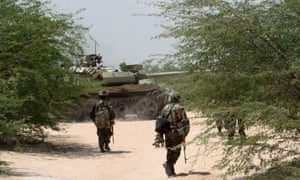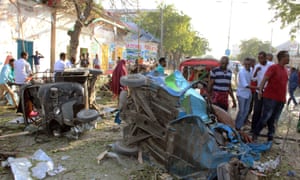{UAH} Al-Shabaab attack kills dozens of Ugandan soldiers in Somalia
Al-Shabaab attack kills dozens of Ugandan soldiers in Somalia
Up to 46 Ugandan peacekeepers killed in double suicide car bomb attack by Islamist militants
Dozens of Ugandan soldiers are thought to have been killed when Islamist extremists attacked their base on Sunday in the latest of a series of bloody strikes against peacekeepers in Somalia.
Local officials told the Guardian that as many as 46 Ugandan troops, part of the 22,000-strong regional force in Somalia, died in the attack by the al-Qaida affiliated al-Shabaab movement in the town of Bulamarer, 80 miles south-west of the capital, Mogadishu, at around 9am local time.
Ugandan officials have said only four soldiers were killed in the attack, which was repulsed with heavy casualties among the extremists.
Such attacks are designed to hasten the departure of Amisom, the military and policing coalition under the authority of the African Union, which has been fighting al-Shabaab for more than a decade.
Al-Shabaab, which once controlled much of Somalia, wants to topple the western-backed government in Mogadishu.
Militants detonated a suicide car bomb at the gate of the Ugandan army base in Bulamarer before storming into the complex. A second suicide car bomb targeted a convoy of Ugandan army reinforcements coming from a nearby base.
"It was around 9am local time when the first car, which was a truck loaded with explosives, hit the Ugandan army base and then heavy gunfire broke out," Ali Mohamed, a local farmer, said in a phone interview.
"Then suddenly a second car, which was another truck with explosives and was driven by a young suicide bomber, hit a convoy of Ugandan forces trying to help their friends who were under attack," he added.
"I saw lots of smoke coming from inside the base, which was heavily guarded. Al-Shabaab fighters were shooting the soldiers. Forty soldiers died," he said.
Abdi Nur Hashi, a Somali military colonel stationed near the Ugandan base, said 46 soldiers were killed.
"Most of them were friends. We used to share food and drinks together in their base," he said. "We tried to help our Ugandan friends but there was also a suicide car which attacked our base. Many of the [Ugandan] soldiers died due to lack of emergency evacuation because the terrorists blocked the road," he said.
The colonel said one Somali soldier died and several others were injured.
Al-Shabaab also attacked local civilians, setting houses and shops ablaze, witnesses said.
Halima Nur, a local shop-owner, said she ran away to seek shelter, but when she returned in the afternoon there was "nothing but ashes".
"After raiding the military base, al-Shabaab came into our shops and burned down everything. My neighbour was also killed. I was the first to escape. I am lucky to be alive," she told the Guardian.
"Al-Shabaab several times warned us because we sell small items like cigarettes and juice to the soldiers, which al-Shabaab regards as apostasy.
"We hoped for better security, but it seems it is deteriorating. Government officials are busy quarrelling with one another while al-Shabaab launches continuous bloody attacks. We need the world to help us and do not let Amisom leave this country," she said.
Abdifatah Haji Abdulle, the deputy governor of Lower Shabelle region, said al-Shabaab also attacked four more remote villages around Bulamarer on Sunday.
"The death toll could be higher than our current estimate. These were coordinated attacks," the deputy governor said.
A series of recent attacks by al-Shabaab have underlined the movement's resilience. In October the group was responsible for one of the bloodiest single terrorist attacks since 2001 when a bomb killed more than 500 people in Mogadishu.
There are widespread fears that a significant reduction of Amisom's strength could lead to a resurgence of al-Shabaab.
In July 2016, the African Union announced plans for a staggered withdrawal, to begin in October 2018 and be completed by the end of 2020. A UN security council resolution, adopted last August, authorised a gradual reduction.
A thousand troops were withdrawn last year and another 1,000 are due to leave by October this year.
African Union mission spokesmen were unobtainable on Sunday night and there was no official comment from the mission's headquarters in Mogadishu.
A Ugandan army spokesman said 30 al-Shabaab militants had been killed"during their attempted attack on UPDF bases in Somalia".
"The struggle continues," Brigadier Richard Karemire said on Twitter.
Al-Shabaab spokesman Abdiasis Abu Musab said the militants killed 59 Ugandan soldiers.
"Thanks God. The attack was successful. Our mujahideen killed 59 Ugandan soldiers during the raid. We have also lost 14 of the mujahideen," he said.
In January 2016 al-Shabaab killed more than 100 Kenyan soldiers at their base in El Adde, near Somalia's southern border.
Disclaimer:Everyone posting to this Forum bears the sole responsibility for any legal consequences of his or her postings, and hence statements and facts must be presented responsibly. Your continued membership signifies that you agree to this disclaimer and pledge to abide by our Rules and Guidelines.To unsubscribe from this group, send email to: ugandans-at-heart+unsubscribe@googlegroups.com






0 comments:
Post a Comment